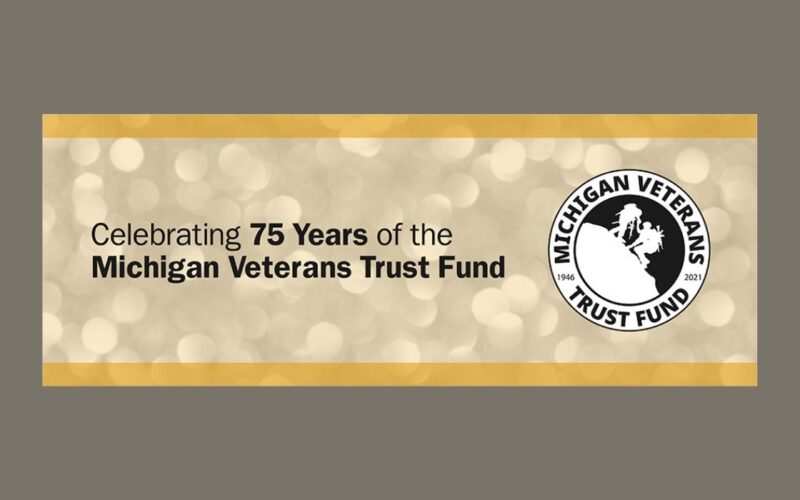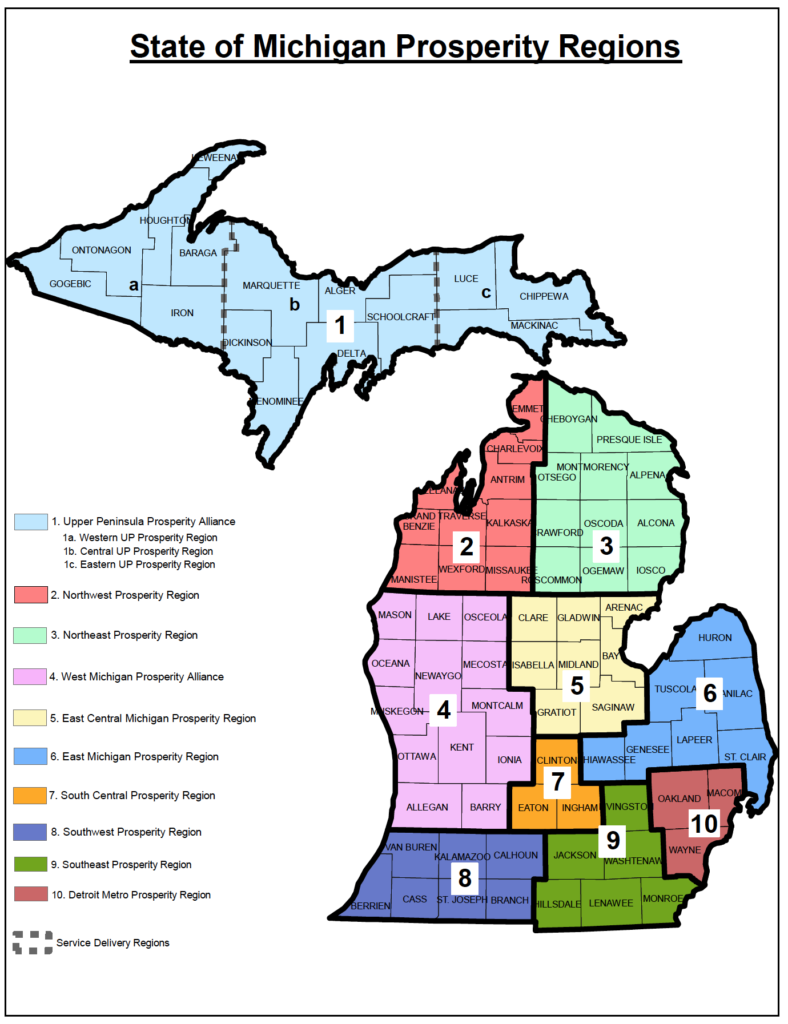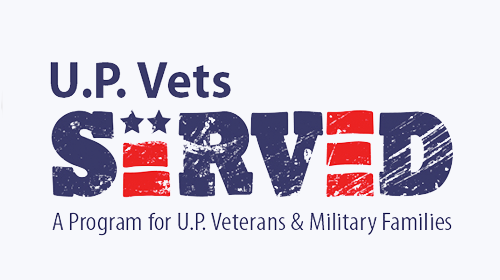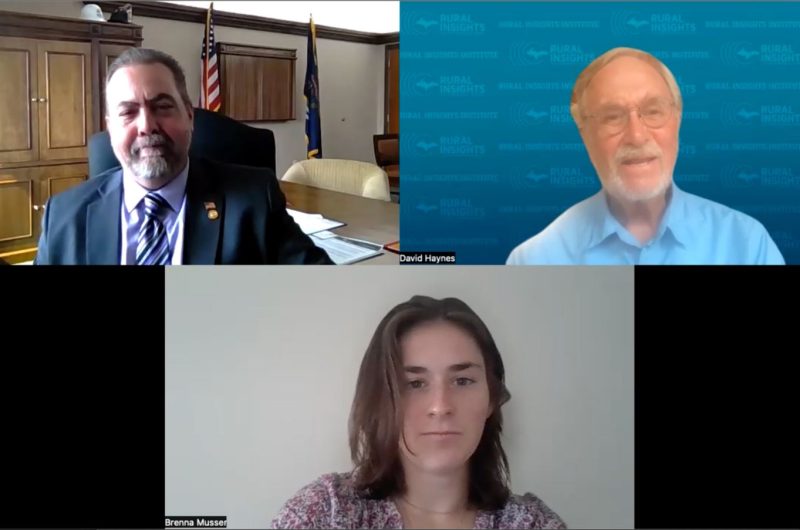MVTF Turns 75 and Celebrates by Addressing Veteran Food Insecurity

This article will take a moment to acknowledge the Michigan Veterans Trust Fund (MVTF) at its 75th year anniversary. Then the discussion will transition toward food insecurity and current initiatives in Michigan and specific to the Upper Peninsula which are aimed at addressing the issue among veterans in our region.
To begin to understand the MVTF’s impact on veterans and their families over the years, we must talk about how it got its start.
Shortly after WWII ended in 1946, policymakers in Michigan established the MVTF with an initial $50 million endowment to support military veterans and their families. The original corpus has grown to around $69 million, and is administered by a gubernatorial-appointed Board of Trustees.
In the 75 years since then, the Trust Fund has assisted nearly 650,000 veterans and their dependents with at least $125 million in aid benefits. Eligible combat-era veterans and dependents apply for assistance with hardships in things like mortgage and rent assistance, home repairs and utility bills.
MVTF has expanded its combat-era veteran outreach to include veteran-centric areas, such as: access to free financial counseling; partnerships with Habitat for Humanity of Michigan to increase their ability complete home repairs; donations made to Gleaners Community Bank and MVAA to fund food insecurity programs in Michigan; and providing grant funding to Heroes Haven, which supports veterans with PTSD.
Although many things have changed through the years, the Trust Fund remains a bedrock of services for Michigan’s wartime veterans experiencing unforeseen financial hardship. Any Michigander can find a local benefits counsellor provided by the Michigan Veterans Affairs Agency (MVAA) by calling 1-800-MICH-VET.
Now I want to transition the conversation to the current state of food insecurity initiatives, and briefly look at those which are within the Upper Peninsula.
On the topic of food insecurity, we first need to define it and talk about its implications. A study conducted by Audrey Murrel and Ray Jones on measuring food insecurity published in February of 2020 states that over time, researchers have expanded on the measuring indicators of food insecurity.
According to Murrel and Jones, researchers not only examine food deserts (geographic areas with little to no access to supermarket quality food), but look for a more comprehensive understanding of the food environment.
The food environment as we understand it includes the availability of supermarkets and other affordable quality food outlets. Also important to the equation, the in-store customer shopping experience which takes into account food prices, access, and availability of healthy food.
Other studies are now being focused on the varying demographic factors such as race, poverty level, and neighborhood tendencies with regard to food access. These newer studies are including the implications of health and diet as it is related to food insecurity.
So what does all of that mean for the veterans Upper Peninsula of Michigan?
Well, identifying communities as food-insecure is the first step in addressing the problem. In a study published by the Northwestern University’s Institute for Policy Research, Michigan’s overall food insecurity has maintained a level at or above 20% of the population throughout the duration of the COVID-19 pandemic.
At times throughout Summer 2020 this food insecurity figure was seen topping 25%. Current data indicates the weekly food insecurity rate in Michigan is 21.7%, while the national average is 21.3%. (Schanzenbach, Diane & Tomeh, Natalie, 2020)
Given that more than 1 in 5 of our citizens are experiencing these issues, and current veteran census data suggests there are over 28,000 veterans living in the Upper Peninsula, then about 6,100 veterans in our region are affected by food insecurity. The next question that needs to be asked is what is being done about it?
Earlier it was mentioned that the Michigan Veteran Trust Fund has recently donated some of its funds to “Gleaners,” referring to the Gleaners Community Food Bank which has a few outlets that predominantly service Southeast Michigan.
MVTF also donated $300,000 to the Michigan Veterans Affairs Agency, which in turn has developed the “Food4Vets” program. This program is currently being facilitated through MVAA’s Community Outreach and Regional Engagement (C.O.R.E) Initiative and regional Veteran Community Action Teams (VCATs).
This program is designed to distribute up to $30,000 across each of Michigan’s 10 Economic Prosperity Regions (see: Regional Prosperity Initiative), and the Upper Peninsula being designated as Region 1.
Two other national organizations that are directly contributing to the efforts which address food insecurity are Feeding America and the Bob Woodruff Foundation.
Feeding America has recently published data to evidence the extent of their support. (Working Together To End Hunger) Their national network boasts 200 food banks and over 60,000 food pantries/food truck programs, with 1 out of 7 Americans served. Communities can find support for a Feeding America program by getting some of its members trained as “Feeding America Food Coordinators,” and raising the necessary funds.
Next, the Bob Woodruff Foundation is different from Feeding America in that BWF partners with community and national programs, organizations, and the military community, and advocates to create healthy, positive futures for our service members, veterans and their families (SMVF).
To date, BWF has invested at least $76 million through the direct provisioning of over 500 grants through its community partners which have benefitted 11 million veterans and military families. Earlier this year, the Upper Peninsula Veteran Community Action Team(VCAT) was granted funds from the BWF, and used these to develop a Veteran Food Benefit Program.
This specific grant enabled the VCAT to connect with over 270 veterans and veteran family members. Through these efforts it issued over 200 $50 food benefit cards to be used at stores like Meijer. Perhaps more importantly, this opportunity to connect directly with veterans resulted in over 60 direct assistance requests for items other than food.
To facilitate the program, the UP VCAT partnered with the Upper Peninsula Commission on Area Progress (UPCAP) and their 2-1-1 call center. Their operators completed applications and recorded the requests, which were later followed-up on by a local County Veteran Service Officer (see: “Find a Benefits Counsellor.”)
The UP VCAT is drawing another round of grant applications through organizations such as BWF. If you have any questions or interest in these current initiatives, or if you of a veteran who may be experiencing hardship, please contact Jesse Sherman, Region 1 Senior Veteran Community Engagement Officer for the Michigan Veterans Affairs Agency at: ShermanJ4@michigan.gov; or contact Frank Lombard, Upper Peninsula Veterans Program Manager for the Upper Peninsula Commission on Area Progress at: LombardF@upcap.org.
References
“Find a Benefits Counselor.” Michigan Veterans, 25 Feb. 2021, www.michiganveterans.com/find- benefits-counselor.
“Look Who’s 75! Michigan Veterans Trust Fund Going Strong.” Michigan Veteran Affairs Agency, 25 Feb. 2021, www.michiganveterans.com/a/Look-who-s-75-Michigan-Veterans- Trust-Fund-going-strong.
Murrell, A., & Jones, R. (2020). Measuring Food Insecurity Using the Food Abundance Index: Implications for Economic, Health and Social Well-Being. International Journal of Environmental Research and Public Health, 17(7), 2434–. https://doi.org/10.3390/ijerph17072434
“MVAA Emergency Assistance Form.” Michigan Veterans Affairs Agency, 25 Feb. 2021, www.michiganveterans.com/mvaaEmergencyAssistanceForm.
“Regional Prosperity Initiative: Michigan Business.” Michigan Economic Development Corporation (MEDC), 2021, www.michiganbusiness.org/about-medc/regional -prosperity-initiative/.
Schanzenbach, Diane, and Natalie Tomeh. “State Levels of Food Insecurity During COVID-19 .” Institute For Policy Research – Northwestern University, INSTITUTE FOR POLICY RESEARCH, 9 Oct. 2020, www.ipr.northwestern.edu/news/2020/food-insecurity-app- visualizes-national-state-by-state -data.html.
Seligman, Hilary, and Berkowitz, Seth. “Our Research > Interactive Data.” Feeding America, July 2019, www.feedingamerica.org/research/interactive-data.
Veteran Population.” US Census Bureau, Department of Veterans Affairs, Nov. 2019, www.va.gov/vetdata/Veteran_Population.asp.
“Watch Our Second Leaders Eat Last Panel Discussion.” Bob Woodruff Foundation, 3 Mar. 2021, bobwoodrufffoundation.org/.
“Working Together to End Hunger.” Feeding America, 2021, www.feedingamerica.org/our-work.
Newsletter
Related Articles






